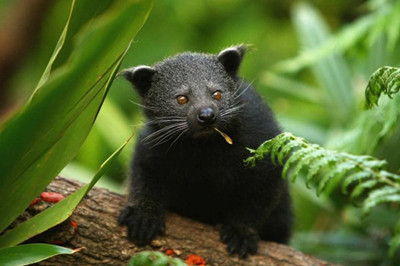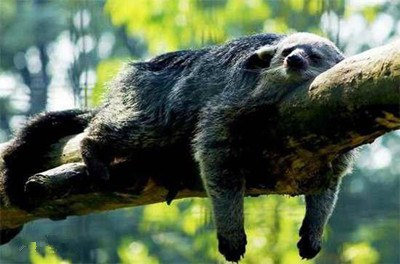(单词翻译:单击)
听力文本
Chances are you've never seen a binturong.
It's a tree-dwelling mammal about the size of a raccoon that's native to Southeast Asia.
But if you've ever been to the movies, you'd be familiar with their scent.
That's because binturongs smell like freshly cooked popcorn.
And now, in a major advance in research connecting animal odors to human recreational venues, researchers know why.
In the wild, binturongs, also called bearcats, are thought to spend most of their time alone.
So to communicate with potential mates—or rivals—they leave behind aromatic messages.
Although to you and me their musk evokes a matinee, to other animals it reads pure binturong.
But previous studies of the animals' scent glands failed to find chemicals that could account for the distinctive stank.
Desperate for an answer, the researchers opted to peruse some pee.
They ever-so-gently squeezed 33 sedated binturongs at a North Caroline wildlife sanctuary to produce urine for analysis.
And they discovered that the samples contained a compound called 2-acetyl-1-pyrroline, or 2-AP—which is the very same chemical that lends its distinctive scent to popcorn, as well as to some rice and breads.
The finding is served up in the journal Naturwissenschaften, or The Science of Nature.
Popcorn gets its 2-AP from the Maillard reaction, chemistry that occurs as corn kernels heat up.
But for bearcats, who don't have access to an air popper, it's probably the bacteria present on their fur or in their intestines that help cook up their signature scent—the researchers confirmed that the animals don't get their 2-AP from their diet, which, in captivity, includes kibbles and mice.
When binturongs go wee, they tend to soak their tails and feet, which ensures that they leave behind a trail of odiferous information about their species, sex, and reproductive readiness.
Of course, if you find yourself in binturong country, remember: that ain't popcorn you smell.
So don't lick your fingers.
参考译文
你可能从来都没有见过熊狸。
这种产于东南亚地区在树上生活的哺乳类动物,体型和浣熊相当。
如果你看过相关电影,就会对这种动物所散发出的气味并不陌生。
这是因为熊狸的气味就像新鲜出炉的爆米花。

而现在,一项将动物气味同人类娱乐场所联系在一起的研究已经让研究人员们揭开熊狸身上散发出这样气味的奥秘。
在野生环境下,被称作小熊猫的熊狸一般是单独生活。
因此为了和同伴或竞争对手进行交流,它们常常会留下芳香气味作为信号。
尽管对你我而言,这些香气只会使我们想到影院,但其它动物则嗅到的只是熊狸。
但先前对动物气味腺的研究并没找出和这些气味相对应的化学物质。
为了寻求答案,研究人员们从熊狸的尿液入手。
在北卡罗来那野生保护区,他们对33只熊狸注射镇静剂后十分轻柔的挤出了它们的尿液进行分析。
结果他们发现尿液样本中含有一种名为2-乙酰-1-吡咯啉或简称为2-AP的化合物,这种物质和爆米花的独特气味十分相似,而大米、面包类食物中也存在。

这项研究已在《自然科学》杂志上发表。
爆米花之所以会产生2-AP是因为制作过程中玉米粒受热发生了美拉德反应所致。
但熊狸体内可没有空气爆米花机,很可能是它们毛皮或肠道的细菌制造出这种物质,研究人员们进一步确认了其饮食中也没有产生2-AP的可能,笼养中的熊狸会以粗磨食物及老鼠为食。
当熊狸尿尿的时候会将尾巴和脚浸湿,这样就在离开后它们就会留下一系列包含种类,性别及生殖能力等的气味痕迹信息。
当然,如果你发现自己处于熊狸的所在地,记住:你所闻之香可并非爆米花。
因此千万不要舔手指哦!
译文为可可英语翻译,未经授权请勿转载!
重点讲解
1.familiar with 熟悉
例句:Most people are familiar with this figure from Wagner's opera.
多数人都熟悉瓦格纳歌剧中的这一人物。
2.communicate with 沟通
例句:Group members have to communicate with each other through role-play.
小组成员必须通过角色扮演互相交流。
3.leave behind 留下
例句:Many of the women had left their husbands behind and they told of their fears thatthey may never see them again.
这些女人中很多抛下了自己的丈夫,她们说害怕可能永远都见不到他们了。
4.fail to 失败
例句:Some schools fail to set any homework.
有些学校没有布置任何作业。


